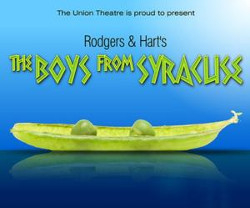The Boys from Syracuse
The Union Theatre in Southwark stages a revival of Rodgers and Hart’s 1938 musical

Trevor Nunn once did The Comedy of Errors as a musical (nearly) but of course he’d been beaten to it in 1938 by Rodgers and Hart, whose blissful vaudevillian salvo was the first ever musical based on a Shakespeare play and is still probably the best.
If a tale of mistaken identity was good enough for Shakespeare, they said (cheekily implying it wasn’t), then it was good enough for them: “In Verona my late cousin Romeo was three times as stupid as my Dromio; for he fell in love and then died of it, poor half-wit!”
That’s the first verse of “This Can’t Be Love” one of several classic numbers despatched with great brio and verve in Ben De Wynter‘s infectiously eager revival, and the basis of the Act One ballet in which the “wrong” Antipholus is embroiled in a louche cabaret and a choreographed orgy (the cast are seen sleeping it off after the interval).
No new musical you see this or next year will have better lyrics than Hart’s (or indeed Alan Jay Lerner’s in last month’s Union treat, On a Clear Day). It’s the perfect match of wit and musical idiom that does it, and Rodgers wrote with a special sort of delight that he reined in and channelled more operatically with Oscar Hammerstein.
This is still the light musical theatre of 1920s and 1930s revue, tailored for a specific cast of boffo comedians, and it’s a great tribute to the antics of newcomer Matthew Cavendish as the Dromio of Syracuse and Kaisa Hammarlund as the Courtesan that they come across to the knockabout manner born; the first a quick-thinking, wise-cracking dummy, the second a full-on blowzy siren with a leg action like, well, nut-crackers.
Cavendish shares the witty battle-of-the-sexes point number, “He and She,” with the hilarious, amply-endowed Luce of Natalie Woods, trailing the upfront shenanigans of Carrie Sutton’s scheming Adriana (who’s “Falling in Love with Love”) and Aaron Hayes Rogers’ bemused Irish Antipholus of Syracuse (who’s told more than once that home is the place you stay in while the chariot’s being fixed).
There’s a bit of a messy beginning – always a mistake to “action” the overture – and Mark Smith’s choreography doesn’t have the killer edge this tiny space needs and usually gets. But “Ladies of the Evening” and “Sing for Your Supper” (Cara Dudgeon’s sweet Luciana making the trio with Woods and Sutton) are beautifully restored, and the small band (bass, violin, drums) under Michael Riley’s musical direction at the keyboard performs small miracles.












